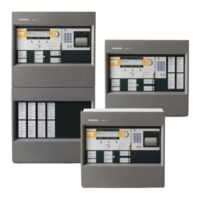171 |
Building Technologies
Detector line
Electrical connection between the detectors and the fire control panel. There are collective detector lines
and addressed detector lines.
Effect
An impact caused by a control, e.g., activation of a hardware output or a command.
Ethernet station
Participants in the Ethernet sub-net without local connection for the PC.
External alarm indicator
Optical element for displaying the fire location, which is at some distance from the detector. It is normally
mounted in the room at the point where the corresponding detector is accessible.
Floor repeater display
A display device without operating elements.
Floor repeater terminal
A display device with operating elements for acknowledging and resetting alarms and faults.
GAP
Abbreviation for 'Global Access Point'. Participant in the Ethernet sub-net for the connection between the
Ethernet sub-net and a management station (BACnet client) and / or for remote access with the PC. If there
is a secondary GAP, the GAP becomes the main GAP. Can be operated as a DHCP server in the Ethernet
sub-net.
Hardware tree
Depiction of the hardware of a fire detection installation.
Line card
Card for connecting peripheral devices. The card can be a plug-in card or it can be integrated into the
periphery board.
Line separator
An electronic switch which automatically disconnects the defective part of the line in the event of a short-
circuit.
Logical channel
Depiction of a logical device function in the detection or control tree. The logical channel is always the
bottom level in the structure tree.
Loop
Detector line topology which runs from the fire control panel via the fire detectors and back to improve
operational reliability. This type of wiring allows all detectors to communicate with the control panel even in
the event of an open line or short-circuit.
Non-stationary device
Devices mounted with a base (exception: alarm sounders and radio detectors).

